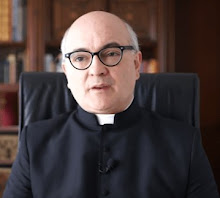Vivimos unos tiempos de admirables estudios teológicos.
La teología ha alcanzado un nivel de profundidad y de especialización y de humanidad
que me resultan fascinantes. La gente cotidiana que encontramos por la calle
cree que puede hablar de determinados campos de la teología con toda audacia.
Si se le hace ver que sobre algo en concreto no sabe, lo despreciará como
detallismos que no tienen ningún interés.
Para comprobar el nivel que tiene la teología del siglo XXI a nivel global, baste leer el comienzo del listado de artículos del último número de la revista The Journal of Theological Studies:
Ethical Reading:
The Transformation of the Text and the Self
Hindy Najman
Faith and
Existential Security: Making Deuteronomy 8 Respond to a Current Sociological
Theory
Zoltán Schwáb
An Essence–Energy
Distinction in Philo as the Basis for the Language of Deification
Tikhon Alexander
Pino
Two Lost Lines of
the Coptic Hermas in BnF Copte 130 (2) F. 127
Dan Batovici
Melito’s Peri
Pascha 1–5 as Recovered from a ‘Lost’ Leaf of Papyrus Bodmer XIII
Brent Nongbri,
Stuart George Hall
The Parable of
The Lame and The Blind In Epiphanius and its Relation to Jewish Sources: New
Texts
Ophir Münz-Manor
P.Mich. inv.
4461KR: The Earliest Fragment of the Didascalia CCCXVIII Patrum Nicaenorum
Lincoln H Blumell
Revisiting the
Date of Chrysostom’s Homilies on Genesis
Doru Costache
Under the Spell
of John Philoponus: How Chalcedonian Theologians of the Late Patristic Period
Attempted to Safeguard the Oneness of God
Dirk Krausmüller
Creo que el listado habla por sí mismo. Eruditos que
han dedicado toda su vida a estudiar una determinada parte del mundo de la teología.
Por eso, cuando uno habla con ciertas personas (o les lee) resulta necesario
hacerlo con mucha humildad.

